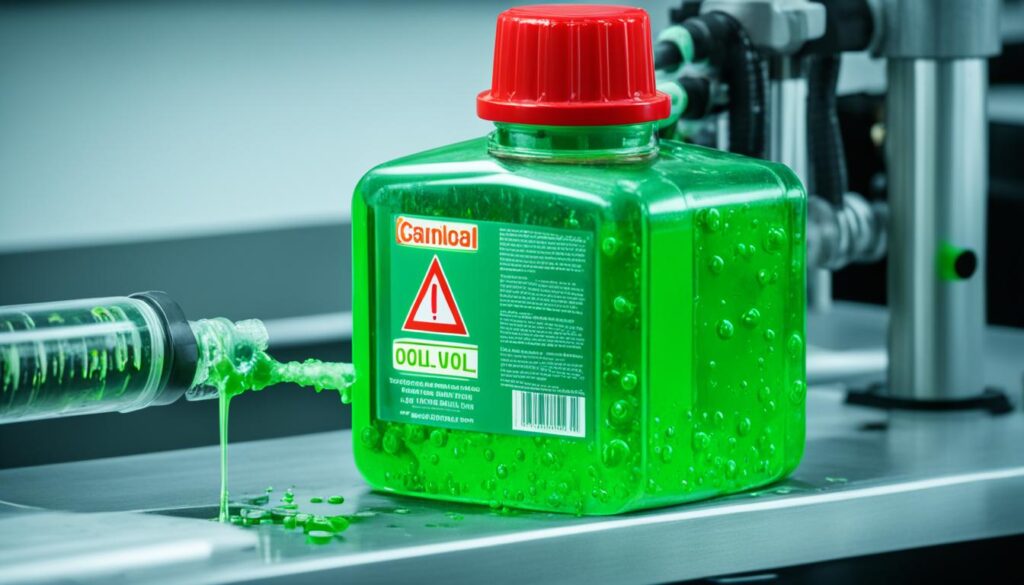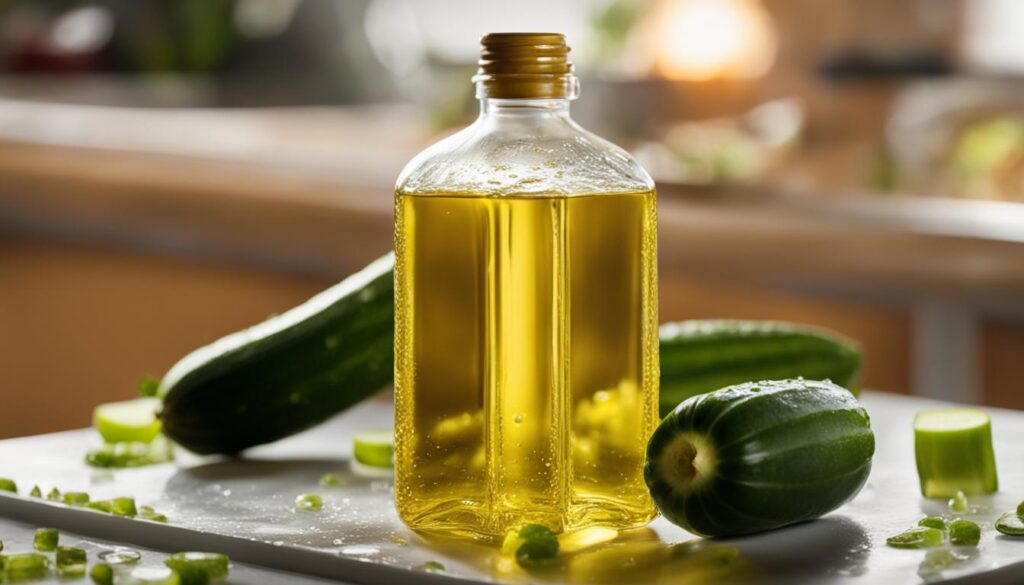Can You Use Vegetable Oil as a Lube? Safe Tips

Welcome to our comprehensive guide on using vegetable oil as a lubricant. Many people wonder if vegetable oil can be a safe alternative for lubricating various household or automotive applications. In this article, we will explore the safety and practical aspects of using vegetable oil as a lubricant, providing expert insight and tips to help you make an informed decision.
Key Takeaways:
- Using vegetable oil as a lubricant is a viable option in certain circumstances.
- Consider the safety factors and compatibility with materials before using vegetable oil as a lubricant.
- Compare vegetable oil with commercial lubricants for performance, cost, and availability.
- Follow recommended tips and guidelines for safe use of vegetable oil as a lubricant.
- Properly handle and dispose of used vegetable oil lubricants to ensure responsible use.
Understanding Vegetable Oil as a Lubricant
When considering vegetable oil as a lubricant, it is crucial to understand its properties and how they can affect its effectiveness in various applications. Vegetable oil is a natural and readily available alternative to commercial lubricants, making it an appealing option for those seeking eco-friendly solutions.
Viscosity: One important property of vegetable oil is its viscosity, which refers to its thickness or resistance to flow. Vegetable oils typically have a higher viscosity than most conventional lubricants. This can be advantageous in certain scenarios where a thick lubricant is required, such as in heavy machinery or high-load applications.
Heat Resistance: Vegetable oil has a moderate heat resistance, which means it can withstand elevated temperatures to some extent without breaking down or losing its lubricating properties. However, it is essential to note that vegetable oil may not perform as well as specialized high-temperature lubricants in extreme heat conditions.
Compatibility with Different Materials: Vegetable oil generally exhibits good compatibility with a wide range of materials, including metals, plastics, and rubber. This makes it suitable for lubricating various components in different industries, such as automotive, manufacturing, and household applications.
Sustainability: One of the notable advantages of using vegetable oil as a lubricant is its environmental sustainability. Vegetable oil is derived from renewable sources and is biodegradable, making it an eco-friendly choice for those concerned about reducing their carbon footprint.
To better understand the properties of vegetable oil as a lubricant and its advantages over commercial lubricants, let’s take a closer look at a comparative table:
| Properties | Vegetable Oil | Commercial Lubricants |
|---|---|---|
| Viscosity | Higher | Varies |
| Heat Resistance | Moderate | Specialized options available |
| Compatibility with Different Materials | Good | Varies |
| Sustainability | Biodegradable | Varies |
Table: A comparison between vegetable oil and commercial lubricants in relation to various properties.
While vegetable oil exhibits several favorable properties as a lubricant, it is essential to consider other factors such as specific application requirements, performance needs, and compatibility with equipment. This will help determine whether vegetable oil is a suitable choice or if a specialized commercial lubricant would be a better option.
Next, we will delve into the safety considerations when using vegetable oil as a lubricant and provide practical tips for its effective use.
Vegetable Oil vs Commercial Lubricants
When it comes to lubrication, the choice between vegetable oil and commercial lubricants can be a challenging decision. Both options have their advantages and disadvantages, and understanding these factors is crucial in making an informed choice for your specific needs.
Let’s take a closer look at the differences between vegetable oil and commercial lubricants:
Performance
Vegetable oil, being a natural product, may not have the same performance capabilities as commercial lubricants. Commercial lubricants are specifically formulated to meet the demands of various industries and applications. They offer superior lubrication and can withstand high temperatures, heavy loads, and extreme conditions.
Commercial lubricants often undergo rigorous testing to ensure optimal performance and efficiency. They are designed to reduce friction, prevent wear and tear, and extend the lifespan of equipment.
Cost
One of the significant advantages of vegetable oil is its cost-effectiveness. Vegetable oil is generally more affordable than commercial lubricants, making it an attractive option for budget-conscious individuals or small-scale applications.
On the other hand, commercial lubricants may have a higher upfront cost. However, their exceptional performance and extended lifespan often justify the investment in the long run.
Availability
Vegetable oil is widely available in grocery stores and supermarkets, making it easily accessible for personal use or small-scale applications. It can be purchased in various quantities, from small bottles to larger containers, depending on your needs.
Commercial lubricants, on the other hand, are typically sold in specialized stores or through industrial suppliers. They may have a wider range of options and formulations tailored to specific industries and applications.
Environmental Impact
Vegetable oil has the advantage of being biodegradable and environmentally friendly. It poses less risk to the environment in case of spillage or leakage, compared to some commercial lubricants that may contain harmful chemicals or additives.
Commercial lubricants, however, are constantly evolving to meet environmental standards and regulations. Many manufacturers have introduced eco-friendly options that offer comparable performance while minimizing the environmental impact.
“Vegetable oil, being a natural product, may not have the same performance capabilities as commercial lubricants. Commercial lubricants are specifically formulated to meet the demands of various industries and applications.”
In summary, the choice between vegetable oil and commercial lubricants depends on your specific requirements and preferences. While vegetable oil can be a cost-effective and readily available option, commercial lubricants offer superior performance and reliability, especially in demanding environments and high-performance applications.
Next, we will explore the safety considerations when using vegetable oil as a lubricant.
| Factors | Vegetable Oil | Commercial Lubricants |
|---|---|---|
| Performance | May not meet high demands | Specifically formulated for optimal performance |
| Cost | Affordable | Higher upfront cost, but long-term cost-effective |
| Availability | Widely available | Specialized stores or industrial suppliers |
| Environmental Impact | Biodegradable, less risk to the environment | Constant improvement towards eco-friendly options |
Safety Considerations when Using Vegetable Oil as a Lube
When considering the use of vegetable oil as a lubricant, it is important to be aware of the safety considerations associated with this alternative option. While vegetable oil can serve as a suitable lubricant in some cases, there are potential risks and limitations to be mindful of.
Potential Risks
One potential risk of using vegetable oil as a lubricant is allergenicity. Some individuals may have allergies or sensitivities to specific types of vegetable oils. It is crucial to ensure that the oil being used is not a known allergen for anyone who may come into contact with it.
Another risk is the potential for spoilage. Vegetable oil can spoil over time, especially when exposed to heat, air, and light. Spoiled oil may become rancid, develop an unpleasant odor, and lose its lubricating properties.
Compatibility with certain materials is also a consideration. Vegetable oil may not be suitable for all applications and materials. Some materials may react adversely to vegetable oil, leading to degradation or corrosion.
Safety Precautions and Tips
To minimize the risks associated with using vegetable oil as a lubricant, here are some safety precautions and tips to keep in mind:
- Check for allergenicity: Before using vegetable oil as a lubricant, ensure that it is safe for everyone who may come into contact with it.
- Store properly: To prevent spoilage, store vegetable oil in a cool, dark place away from heat sources.
- Inspect for signs of spoilage: Regularly check the oil for any signs of spoilage, such as an off odor or appearance.
- Test compatibility: Before using vegetable oil on a particular material, perform a compatibility test on a small, inconspicuous area to ensure there is no adverse reaction.
- Monitor performance: While using vegetable oil as a lubricant, monitor its performance and effectiveness regularly to ensure it is functioning as desired.
By following these safety precautions and tips, you can mitigate potential risks and ensure a safer experience when using vegetable oil as a lubricant.
For more information, refer to the table below:
| Safety Considerations | Precautions |
|---|---|
| Allergenicity | Check for specific allergies Use alternative oil if necessary |
| Spoilage | Store in cool, dark place Regularly inspect for spoilage |
| Compatibility with materials | Perform compatibility test on small area Monitor for adverse reactions |

Practical Tips for Using Vegetable Oil as a Lube
When using vegetable oil as a lubricant, there are several practical tips to keep in mind to ensure its effectiveness and maximize its benefits. Whether you are using it for automotive purposes or household tasks, these tips will help you make the most of vegetable oil as a lubricant.
- Choose the right type of vegetable oil: Not all vegetable oils are created equal when it comes to lubricating properties. Opt for high-quality oils with good viscosity and heat resistance for optimal results. Some commonly recommended options include canola oil, sunflower oil, and soybean oil.
- Clean the surface: Before applying vegetable oil, make sure to clean the surface you will be lubricating. Remove any dirt, debris, or old lubricant residue that could hinder the effectiveness of the oil.
- Apply small amounts: Vegetable oil is best applied in small quantities to avoid excess buildup or mess. Use a dropper or small brush to accurately apply the oil to the desired areas.
- Store properly: To maintain the quality of the vegetable oil, store it in a cool, dry place away from direct sunlight. This will help prevent spoilage or degradation of the oil, ensuring its effectiveness over time.
- Consider specific applications: Vegetable oil can be used for various applications, from lubricating squeaky hinges to loosening rusted bolts. Consider the specific task at hand and adjust your application method accordingly.
Remember that while vegetable oil can be a suitable lubricant for certain tasks, it may not be ideal for all situations. Consider factors such as the material compatibility and desired performance before opting for vegetable oil as a lubricant. Always follow manufacturer recommendations and consult professionals if needed.
Expert Tip: “Vegetable oil can be a cost-effective and environmentally friendly alternative to commercial lubricants for certain applications. However, it’s important to understand its limitations and use it appropriately to ensure optimal results.” – Dr. Johnson, Lubricant Specialist
So, the next time you reach for a lubricant, consider using vegetable oil for its natural properties and versatility. With the right application methods and careful consideration of specific tasks, vegetable oil can provide effective lubrication while being a sustainable choice. Just remember to follow these practical tips to make the most of vegetable oil as a lube.
Pros and Cons of Using Vegetable Oil as a Lube
| Pros | Cons |
|---|---|
| 1. Environmentally friendly | 1. Limited heat resistance |
| 2. Cost-effective | 2. Potential spoilage over time |
| 3. Natural and non-toxic | 3. Compatibility issues with certain materials |
| 4. Versatile applications | 4. Requires careful storage and handling |

Keep in mind that while vegetable oil has its advantages, it’s important to weigh the pros and cons before deciding to use it as a lubricant. Consider the specific requirements of your task and the potential limitations of vegetable oil. By doing so, you can ensure optimal performance and enhance the longevity of the equipment you are lubricating.
Handling and Disposal of Used Vegetable Oil Lubricants
Proper handling and disposal of used vegetable oil lubricants are essential to ensure environmental responsibility and prevent any adverse effects. Follow these guidelines for safe and efficient management:
1. Storage and Containment
When storing used vegetable oil lubricants, it is crucial to use appropriate containers to prevent leakage and contamination. Consider using containers made of durable materials such as plastic or metal with secure lids to minimize the risk of spills or exposure to air.
2. Segregation and Labeling
To avoid confusion and potential accidents, it is important to segregate used vegetable oil lubricants from other types of waste. Clearly label the containers with the contents and the date of use to facilitate proper identification and disposal.
3. Recycling Options
Recycling used vegetable oil lubricants is an eco-friendly solution that promotes sustainability. Many recycling facilities accept used vegetable oil for processing into biodiesel or other valuable products. Check with local recycling centers or waste management authorities for designated drop-off locations or collection programs.
4. Proper Disposal
If recycling options are not available, it is important to dispose of used vegetable oil lubricants responsibly. Do not pour it down drains, toilets, or any outdoor areas, as it can contaminate water sources and harm the environment. Instead, consult local guidelines for hazardous waste disposal to ensure compliance with regulations. Many municipalities have specific drop-off sites or collection events for such materials.
5. Professional Collection Services
In some cases, especially for larger quantities of used vegetable oil lubricants, it may be beneficial to engage a professional waste management company for proper collection and disposal. These companies have the expertise and facilities to handle various types of lubricants safely and in compliance with regulations.
By following these best practices for the handling and disposal of used vegetable oil lubricants, you can contribute to a cleaner and healthier environment.
Conclusion
In conclusion, using vegetable oil as a lubricant can be a viable option in certain circumstances. Vegetable oil’s natural viscosity and lubricating properties make it suitable for various applications, including household and automotive use.
However, it is essential to consider some factors before using vegetable oil as a lubricant. Firstly, ensure compatibility with the material or surface you intend to lubricate. Vegetable oil may not be suitable for some materials, such as rubber or certain metals.
Additionally, while vegetable oil is generally safe for lubrication, it is vital to be mindful of potential risks. Allergenicity and spoilage can occur, especially if the oil is not stored properly. It’s advisable to follow the recommended guidelines for storage and usage, and consult an expert if you have any concerns.
Ultimately, choosing between vegetable oil and commercial lubricants depends on your specific needs and circumstances. Commercial lubricants often come with specialized formulations and additives tailored for specific applications, providing enhanced performance and longevity.
By considering the safety factors, compatibility with materials, and alternative commercial lubricants, you can make an informed decision. Whether you choose vegetable oil or a commercial lubricant, prioritize safety and proper usage guidelines to ensure a smooth and efficient lubrication process.







